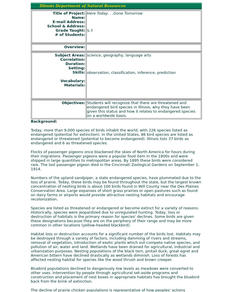Curated OER
Sampling and Comparing Biodiversity
Pupils compares the density and distribution differences of four species of spiders in two hypothetical habitats. They "sample" two habitats and then do calculations such as average density and relative distributions to compare the data...
Curated OER
Exploring Habitats
Students analyze the difference between the human habitat and the different habitats of animals in the six lessons of this unit. The students' imaginations and literature are used to explore important aspects of the living environments...
Curated OER
"We're Back ... Eagles Soar!"
Students use information from Internet websites to create a map of where Bald Eagle habitats can be found after being familiarized with the map by the instructor.
Curated OER
Freshwater Habitats
Middle schoolers take samples from local freshwater sources and examine them for macroinvertebrate life. They take samples from both shallow and deep freshwater environments, measure temperatures, and classify organisms found in their...
Curated OER
Beach Life: Spanish Banks Field Trip
Learners discover beach life. In this beach life instructional activity, students visit a beach to find plant and animal species that live there. They discuss the life cycle and needs of some of these animals through a variety of...
Curated OER
Habitats
Young scholars complete food chains for organisms in three environments. They use copies of the Habitat worksheet. Students review the food chain terms with the teacher. They research related food chains, and interlink these to form a...
Curated OER
Urban Life: What Lives in Our Schoolyard?
Students research living organisms by exploring their school grounds. In this microscopic observation lesson, students gather materials, insects, and objects from their playground and schoolyard and bring them into class. Students...
Curated OER
Kure Waste Chase Game Lesson
Young scholars work together to identify marine debris. They explain the effect of the debris on various ecosystems. They draw different types of ocean currents as well.
Curated OER
Hyperlink Habitats
Students explore an online Hyperlink Habitat to illustrate the interconnectedness of a tropical rainforest ecosystem. They create a map of the Hyperlink Habitat and research a local ecosystem and create their own print or Web version of...
Curated OER
Botanical Garden Field Trip
Students take a field trip to a botanical garden. In this habitat instructional activity, students walk through the garden and see various species of plants and animals. Students take a canopy walk and see coniferous trees. Students...
Curated OER
Beach Life: Clam Dissection
Students investigate clams. In this clam life lesson, students conduct an experiment where they dissect clams. Students compare anatomies of humans and clams.
Curated OER
Designing a Hiking Trail
Put your students' map skills to the test with this engaging cross-curricular project. Given the task of developing new hiking trails for their local community, young cartographers must map out beginner and intermediate...
NOAA
Calling All Explorers
Let's get moving! The second installment of a 2-part series of six adventures helps learners take part in individual explorations by sea and by land. After navigating the waters in an informative WebQuest, groups create and hide their...
Curated OER
Wild Where?
Students investigate why the urban environment is considered a hostile environment; define the concept of endangered species; describe and identify a Peregrine Falcon; describe and identify the eating habits of the Peregrine Falcon.
Curated OER
Knowing the Essential Elements of a Habitat
First graders compare their environment with that of Belize by researching via the internet on the sites provided. Students participate in various activities/centers utilizing the information they discovered.
Curated OER
Entering The Twilight Zone
In this lesson sixth grade students get into groups and research a given ocean habitat. The major features of cold-seep communities are the objective but plenty information is given about other habitats which could be assigned to...
Curated OER
Wildlife
The centerpiece of this lesson plan is a predator-prey simulation in which colored paperclips represent different species of animals camouflaged against a colored background. Relevant follow-up questions are provided. The activity is...
Curated OER
Here Today. . .Gone Tomorrow
Students observe that there are threatened and endangered bird species in Illinois, why they have been given this status and how it relates to endangered species on a worldwide basis. they participate in the Project WILD "Oh, Deer" or...
Curated OER
A Day in the life of...
Students read about and study insects--their distinguishing characteristics, habitats, camouflage methods, defense mechanisms, etc. They draw pictures and write a story from the viewpoint of an insect and share their pictures and stories...
Curated OER
Who Takes Care of the Maya Forest Corridor?
First graders explore the work of conservationists and how they make sure animals and people are safe in their habitats. They identify the rules, laws, jobs, and people who help them feel safe and keep them healthy. Students explore who...
Curated OER
Internet Scavenger Hunt
Students use a computer and the internet to click on highlighted words to find certain answers. They then write the answer to the questions on paper. Finally, students choose one animal to write about. They research the animal on the...
University of Southern California
Wave Erosion Lab
Using a stream table, erosion enthusiasts examine how the density of sediment and how the slope of land contribute to the amount moved by waves. You will not be able to use this entire resource as is; there are teachers' names and...
Curated OER
Sheffield Island Adaptation Activity
You don't have to visit The Maritime Aquarium to use this plan, but you would need to find a location where a variety of bird species live, re-write the activity worksheet to incorporate the local species, and purchase field guides for...
Curated OER
Oceans in Motion
This simple lesson introduces children to basic marine life as well as to show them the necessity of protecting aquatic environments. Some famous marine life animals are introduced via vocabulary words, then children cut out pictures of...

























